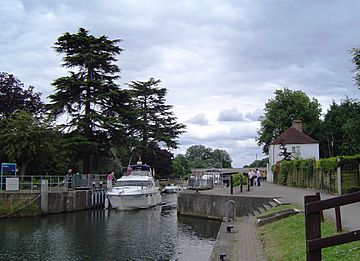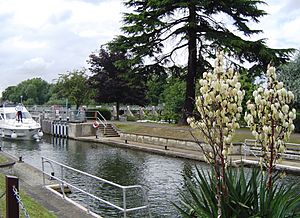Bell Weir Lock facts for kids

Bell Weir Lock with the M25 crossing beyond
|
|
| Waterway | River Thames |
|---|---|
| County | Surrey |
| Maintained by | Environment Agency |
| Operation | Hydraulic |
| First built | 1817 |
| Latest built | 1877 |
| Length | 78.51 m (257 ft 7 in) |
| Width | 7.44 m (24 ft 5 in) |
| Fall | 1.82 m (6 ft 0 in) |
| Above sea level | 47' |
| Distance to Teddington Lock |
17 miles |
| Power is available out of hours | |
Bell Weir Lock is a special kind of gate on the River Thames in England. It helps boats move up and down the river when the water level changes. This lock is located near Runnymede, a famous water meadow linked to the historic Magna Carta.
The lock sits near a hotel and a large bridge. This bridge carries the M25 motorway and the A30 road over the river. The lock was first built way back in 1817. It's one of 45 locks on the River Thames. It's named after Charles Bell, who started a nearby inn and also looked after the lock when it was new.
Contents
Discover the History of Bell Weir Lock
How Bell Weir Lock Was Built
In 1811, people first thought about building a lock here. The actual lock and its walls were built during the winter of 1817-1818. At first, it was called Egham Lock.
Who Was Charles Bell?
The lock later got its name from Charles "Charlie" Bell. He opened an inn called The Anglers Retreat nearby in the 1700s. He also became the person in charge of the lock and the weir (a small dam) when they were built.
Rebuilding the Lock Through the Years
The weir collapsed in 1827 because of heavy ice. Then, the lock itself broke in 1866. Both the lock and weir had to be rebuilt in 1867. The lock was rebuilt again with strong stone in 1877. A new weir was finished in 1904, making it even stronger.
Visiting Bell Weir Lock
You can walk to Bell Weir Lock from the A308 road. It is located right behind the Runnymede Hotel.
Exploring the River Above the Lock
What You'll See on the Riverbanks
As you travel upstream from Bell Weir Lock, you'll pass through Runnymede all the way to Old Windsor. On the left side of the river, there's a facility that helps manage water for the Staines Reservoirs. You'll also see houses with gardens and small islands like "The Island" and Pats Croft Eyot.
On the right side, there are more riverside houses and larger green areas. You'll also spot some unique gatehouses designed by Edwin Lutyens. A pub called The Bells of Ouseley is also along this stretch.
Boating and Activities on the River
This part of the river is popular for boating. The Wraysbury Skiff and Punting Club is located here. There are also regattas (boat races) held in June and August. You can launch pleasure boats from the recreation ground.
Near the lock, there are hotel terraces where you can relax. You might even see special "hot-tub tugs" or boats with awnings.
Walking the Thames Path
The Thames Path is a long walking trail that follows the river. After crossing at Staines Bridge, the path continues along the right bank of the river, leading all the way to Old Windsor Lock.
Bell Weir Lock in Books
Jerome K. Jerome's "Three Men in a Boat"
The famous book "Three Men in a Boat" by Jerome K. Jerome mentions Bell Weir Lock. In the story, the characters Harris and Jerome were very tired. They thought the lock might have disappeared because it took them so long to reach it.
Jerome wrote:
Harris and I began to think that Bell Weir lock must have been done away with ... It was half-past seven when we were through .... We had originally intended to go on to Magna Carta Island....But somehow we did not feel that we yearned for the picturesque nearly so much now as we had earlier in the day. A bit of water between a coal barge and a gasworks would have quite satisfied us for that night
This shows how tired they were after a long day of rowing!
Images for kids
 | Laphonza Butler |
 | Daisy Bates |
 | Elizabeth Piper Ensley |



